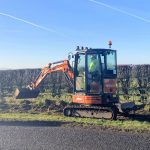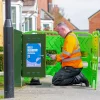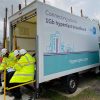Vodafone Says Fears of Network Overload “categorically untrue”

The Chief Technology Officer (CTO) of mobile and broadband provider Vodafone UK, Scott Petty, has blasted mass media reports as “categorically untrue” for claiming that their network(s) won’t be able to cope with the increase in voice and data traffic due to the impact of COVID-19 (Coronavirus).
We’ve already explained, on many occasions over the past few weeks, why it’s wrong to say that internet access providers may be unable to cope with the increase in traffic as more people suddenly find themselves stuck at home (example). Most recently we’ve backed this up with evidence (here and here) to show that the impact upon consumers has, for many, been hardly noticeable (excluding the normal level of faults and line issues etc.).
Generally most broadband ISPs in the United Kingdom appear to be coping quite well and thus the rising levels of data traffic from residential connections have been perfectly manageable (the majority can cope with way above normal levels). Many providers also cache video content (CDN) much closer to their end-users, which can help to significantly ease the burden on their networks from streaming providers.
Advertisement
The operators themselves have also repeatedly told consumers that they can handle it. But despite this not a day seems to go by without another scaremongering article, which frequently fail to understand how such networks work. Many such articles also wrongfully conflate known issues with slower technologies (e.g. copper ADSL and FTTC lines) in the local access market with the separate challenge of capacity / backhaul. Clearly Scott Petty has had enough of this.
Scott Petty, Vodafone CTO, said:
“Our networks remain strong and will cope with this health emergency – we’re doing everything in our power to make them as resilient as possible.
There will be challenges, of course – these are unprecedented times – but the vast majority of our customers will continue to have a really good experience.
So let me explain what we’ve been doing to keep the UK connected.
In short, we’ve been adding more capacity and changing the way we manage voice and data traffic across our complex network of fibre optic cables, copper wires, base stations, exchanges, masts and antennae.
Changing behaviour
Normally, most people travel to work in cities, so we make sure we have the most mobile capacity where they are – at train stations, near offices, restaurants and so on. In this scenario we don’t need as much capacity during the day near the places where they live.
But the coronavirus (COVID-19) has turned this pattern of behaviour completely on its head.
As a result, we are seeing about a 30% increase in internet traffic over our fixed and mobile networks. Also, we’ve seen fixed telephony traffic grow by more than 25% and mobile voice traffic increase by 42%.
While mobile data traffic hasn’t risen much, it has moved to different locations, so we’ve had to adapt to that. But mobile voice calls have mushroomed as people are using their mobiles rather than work desk phones to call helplines such as NHS 111.
We have been handling thousands of simultaneous calls and this has been putting a lot of pressure on our voice switches. So over the last few weeks we’ve been working really hard, often overnight, adding big boxes – computing power effectively – to our core network to improve performance.
Increasing broadband capacity
Our fixed-line broadband network is presenting some bigger challenges. The peak period for broadband data usage is typically between 8pm and 9pm when people come home from work and start streaming.
Now, with more people working from home, videoconferencing and surfing the internet, and kids watching Netflix, playing games, and having online lessons, that busy period is being extended throughout the day.
So we need to increase capacity in the fixed network, and there are three main places where we can do it:
– the central core network
– the aggregation zones (526 around the country managing capacity for areas the size of Bristol, Manchester or part of London, say)
– the BT exchanges, which handle the connections from customers’ homes.
The most likely place where congestion may occur for broadband customers is at the exchanges, so our engineers are going in and increasing the number of links the exchange can handle.
But this takes time to implement. In the meantime, a small minority of customers may experience some congestion and slower broadband speeds as a result.
Traffic management
Another way we’re adapting our network to cope with these new circumstances is by managing the flow of voice and data traffic differently.
When we talk about capacity, think of a water pipe – the thicker it is, the greater the volume of water you can pump through it. That’s its capacity. Now imagine lots of pipes of different lengths and thicknesses. Rather than trying to force all the water down one pipe, you want to spread the load across all your pipes to ease congestion.
And as the volume of water you need to shift changes throughout the day, you change how you use the pipes to cope with this fluctuating demand. So when one part of the network is very busy, we can redirect some of the traffic down a different pipe that’s isn’t so busy.
To sum up, our engineers are doing a brilliant job adapting our fabulous network to these changing, and unprecedented circumstances. We have the technology and the expertise needed to keep the UK connected during these difficult times.
There are challenges, but we are overcoming them. Our networks are more than up to the task.”
At present an arguably bigger problem for broadband and mobile operators to grapple with is the impact on their workforce of COVID-19, which has combined with a rise in demand for customer support and upgrade orders. As a result many consumers are suffering longer than usual waiting times to reach support, but this is true across other industries too.
Likewise some network access operators, such as Openreach, have had to scale back their engineering operations and that is likely to result in delays to normal repair work and new service installations etc.
Mark is a professional technology writer, IT consultant and computer engineer from Dorset (England), he also founded ISPreview in 1999 and enjoys analysing the latest telecoms and broadband developments. Find me on X (Twitter), Mastodon, Facebook, BlueSky, Threads.net and Linkedin.
« COVID-19 ISPs Uno and County Broadband Remove Data Caps























































Is someone able to point me to a source, any source where these rumours are coming from?
It really seemed to kick off when Thierry Breton told VOD services like Netflix to reduce bitrates and instead of telling him to get lost they complied. That seems to have given this a lot of weight – because why would they do it if providers didn’t need the help?
Well my Vodafone Broadband speed has dropped from 66Mbs to 46Mbs
So I guess slowing customers broadband is all part of the plan!!
As part of a team that works day and night to keep the critical infrastructure going, this nonsense that keeps getting repeated — essentially saying that we can’t do our jobs — is insulting.
It’s scaremongering BS that does a great disservice to a lot of people. Out of all the critical workers, it’s hard to see why we as an industry have become a massive target for something that isn’t even true.
It’s almost as if the media think that lying about something enough times makes it true.
Everyone loves a scare story, most of all politicians and regulators, it gives them a purpose in life to be seen to be “doing something”…
To be fair capacity isn’t necessarily to do with competence but cash. However good you are at your job if you don’t have the money to do it properly you can’t and that’s not your fault.
Carl, that’s true as a general point but as the money is available then it does become a question of competence (or management have an odd definition of being cheap, given the amount of 0s in some of the kit pricing). We all realise how vital it is to have a well provisioned and stable network for our customers, and a lot of people are working very hard to make sure it stays that way. I’ve no doubt the other major providers in the UK are in the same boat.
So far these efforts all seem to be paying off, not that this stops so called ‘journalists’ from lying.
Ferrocene – https://www.linkedin.com/in/cthomas – feel free to add me and let’s talk some more away from this 🙂
Hi, well down here in the real world. I am trying to run a business on 1.7mb, oh its 4pm and we are down to 74k. That is me screwed. Started off the day at 40mb and increasingly got throttled. I know the truth is that you are all doing your best but the Vodafone network is, in my experience, one long battle with reliability.
My rural fixed location Three 4G internet connection hasn’t even blinked, fantastic service as ever, handling 250GB a month with ease.
And I can see to good intention of Ofcom, but I think their artice https://www.ofcom.org.uk/phones-telecoms-and-internet/advice-for-consumers/stay-connected is a bit of a jumble of good bad and ugly too!
My Three 4G home broadband is as fast & stable as it’s always been I’m not seeing any issues here in my rural valley.
Also my mum’s Vodafone home broadband is fine, just outside Cardiff.
All this about networks not going to be able to cope is getting boring.
Operators have been saying their networks are always being improved & more capacity added. Now is the time to put their claims to the test.
It is a fact that working from home has had an impact on the network, however this is nowhere near the levels seen in an evening or when a major update is released for a popular game. Networks are coping and very well, there have been significant capacity upgrades in recent times.
I suspect when travelling curbs are relaxed companies will start integrating home working a lot more into their operations.
Keep up the good work, Vodafone is the best.
Pretty sure voda can kick up the bandwidth any time they want to. But,anecdotally, I have noticed my 4G go from 120mbit down to about 40-50 now. Not sure what’s behind that, presumably contention.
I’m running Vodafone 4g for my home broadband , I use to get 30-40mb would drop to around 20-25 at peak.
Now at peak times I get 0.5-1mb , off peak not changed that much , but clearly there is an issue, with my other friends and family are saying the same thing during peak times with other providers
Clearly there are issues but to be accepted during these tines